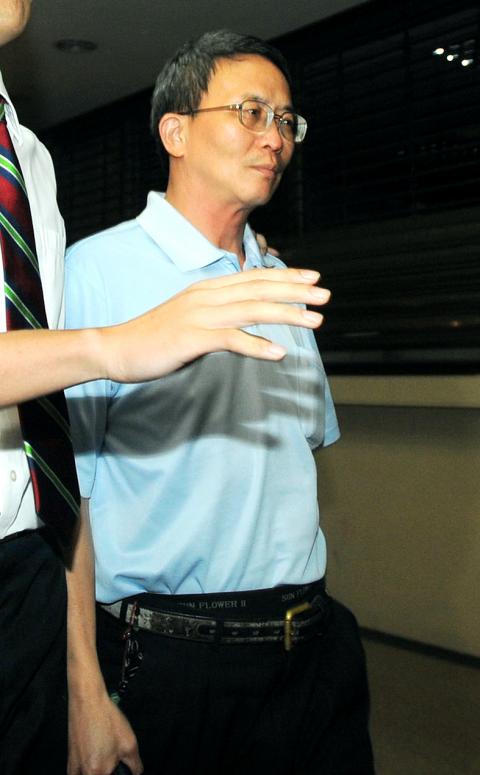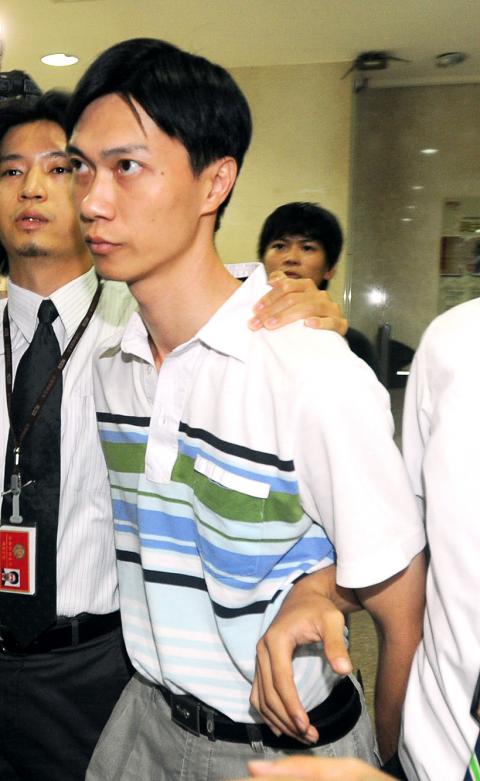The detention of a Central Police University professor yesterday on suspicion of having gathered intelligence for China has sparked much debate, with sources saying that since the signing of a cross-strait agreement on joint efforts to combat crime, China has repeatedly asked Taiwan to establish “anti-terrorism” cooperation targeting pro-Taiwanese independence groups, pro-Xinjiang independence groups, pro-Tibetan independence groups, Falun Gong practitioners and social activists.
Taiwan has so far declined to agree to cooperate because the people China lists as “terrorists” are mostly political dissidents, sources said.
Wu Chang-yu (吳彰裕), an associate professor with the Central Police University’s Department of Administrative Management, teaches Chinese political history at the university.

Photo: Taipei Times
The court granted prosecutors’ request to detain him after interrogation.
Taipei prosecutors also applied to detain Lin Po-hung (林柏宏), a police officer with the -National Police Bureau’s (NPB) Foreign Affairs Department, but the district court released Lin without bail. Prosecutors released another NPB officer, Wu Tung-lin (吳東霖), on NT$100,000 bail.
Prosecutors allege Wu Chang-yu collected information on Chinese dissidents, pro-Tibetan independence activists and the Falun Gong movement in Taiwan, and delivered that information to Chinese authorities.

Photo: Taipei Times
Prosecutors said Wu Chang-yu told investigators the information he offered was not confidential, but common information.
Wu Chang-yu also denied he received money from China, but prosecutors said they have evidence Wu Chang-yu had received at least several free flights to Chinese cities from Chinese authorities.
Wu Chang-yu’s colleagues at the university declined to comment after his arrest, but some have privately said that Wu was troublesome.
Wu Chang-yu receives broad media coverage as a fortune-teller, and the school’s Administrative Management Department has asked him to refrain from mentioning that he teaches at the school while appearing in the media, sources said.
As to whether Wu was helping Beijing gather intelligence, an academic that frequently -travels to China said that China’s intelligence gathering on Taiwan was very thorough, with complete records of who has a special background or is connected to political figures and parties in Taiwanese academia.
This has been made easier for China since President Ma Ying-jeou (馬英九) came to power because cross-strait exchanges have become more frequent, the academic said, adding that the information given to Beijing was both more up-to-date and more accurate.
According to sources, a law professor from National Chengchi University (NCCU) had gone to China on an academic -exchange this summer, but had been questioned by the Ministry of State Security (MSS) without cause and forcibly detained for two to three days.
Academics who are aware of such proceedings said it was not the first time that had happened, and there have been incidents of Taiwanese academics being harassed by the MSS before.
However, the academic added that it was harder to understand why it was still happening, because since Ma came into power, he has claimed that cross-strait relations have improved greatly.
Additional reporting by AFP
Translated by Jake Chung, Staff Writer

US President Donald Trump yesterday announced sweeping "reciprocal tariffs" on US trading partners, including a 32 percent tax on goods from Taiwan that is set to take effect on Wednesday. At a Rose Garden event, Trump declared a 10 percent baseline tax on imports from all countries, with the White House saying it would take effect on Saturday. Countries with larger trade surpluses with the US would face higher duties beginning on Wednesday, including Taiwan (32 percent), China (34 percent), Japan (24 percent), South Korea (25 percent), Vietnam (46 percent) and Thailand (36 percent). Canada and Mexico, the two largest US trading

AIR SUPPORT: The Ministry of National Defense thanked the US for the delivery, adding that it was an indicator of the White House’s commitment to the Taiwan Relations Act Deputy Minister of National Defense Po Horng-huei (柏鴻輝) and Representative to the US Alexander Yui on Friday attended a delivery ceremony for the first of Taiwan’s long-awaited 66 F-16C/D Block 70 jets at a Lockheed Martin Corp factory in Greenville, South Carolina. “We are so proud to be the global home of the F-16 and to support Taiwan’s air defense capabilities,” US Representative William Timmons wrote on X, alongside a photograph of Taiwanese and US officials at the event. The F-16C/D Block 70 jets Taiwan ordered have the same capabilities as aircraft that had been upgraded to F-16Vs. The batch of Lockheed Martin

GRIDLOCK: The National Fire Agency’s Special Search and Rescue team is on standby to travel to the countries to help out with the rescue effort A powerful earthquake rocked Myanmar and neighboring Thailand yesterday, killing at least three people in Bangkok and burying dozens when a high-rise building under construction collapsed. Footage shared on social media from Myanmar’s second-largest city showed widespread destruction, raising fears that many were trapped under the rubble or killed. The magnitude 7.7 earthquake, with an epicenter near Mandalay in Myanmar, struck at midday and was followed by a strong magnitude 6.4 aftershock. The extent of death, injury and destruction — especially in Myanmar, which is embroiled in a civil war and where information is tightly controlled at the best of times —

China's military today said it began joint army, navy and rocket force exercises around Taiwan to "serve as a stern warning and powerful deterrent against Taiwanese independence," calling President William Lai (賴清德) a "parasite." The exercises come after Lai called Beijing a "foreign hostile force" last month. More than 10 Chinese military ships approached close to Taiwan's 24 nautical mile (44.4km) contiguous zone this morning and Taiwan sent its own warships to respond, two senior Taiwanese officials said. Taiwan has not yet detected any live fire by the Chinese military so far, one of the officials said. The drills took place after US Secretary